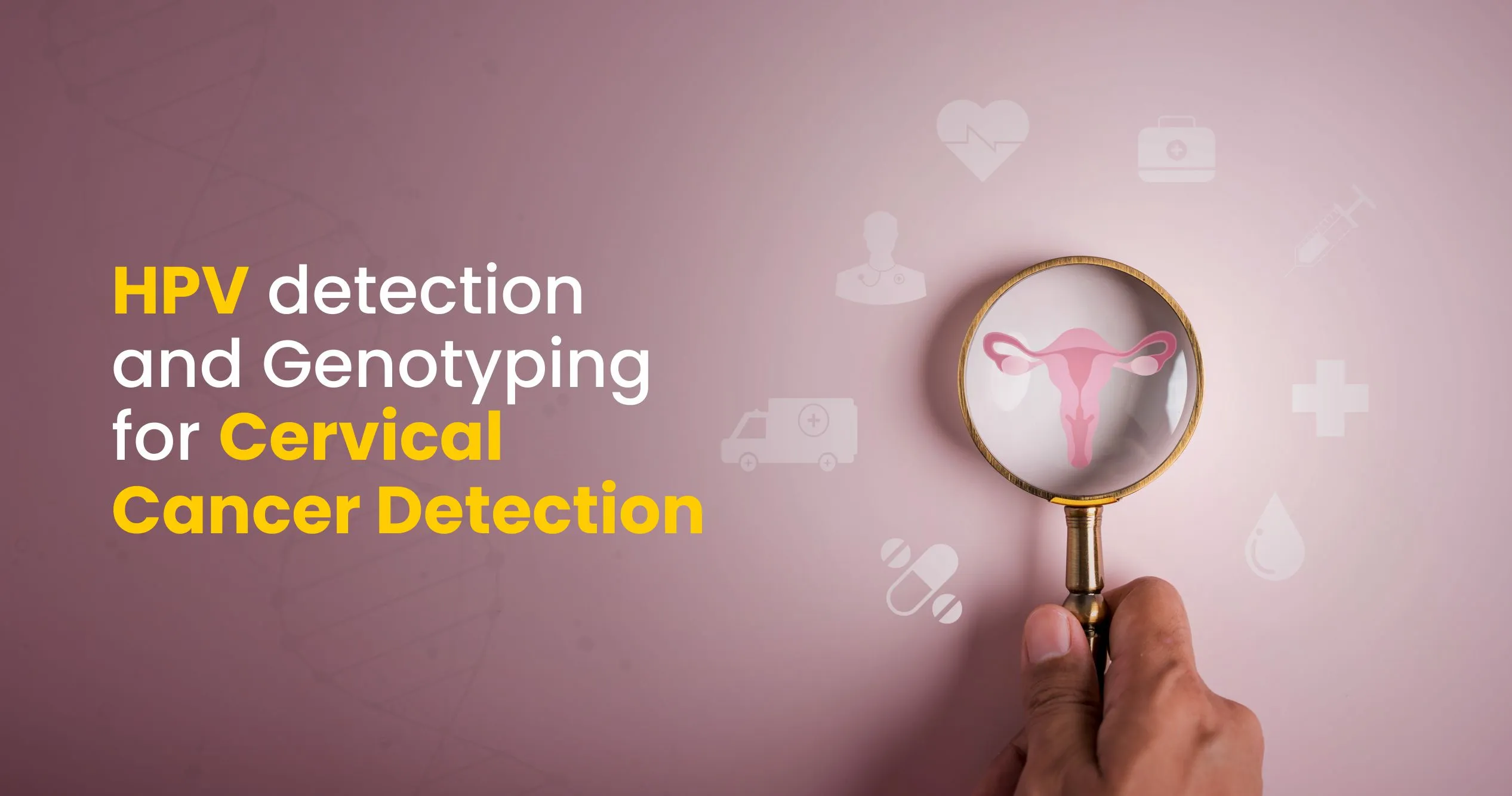HPV Detection and Genotyping for Cervical Cancer Detection
Jul 28, 2023

Do you know that cervical cancer poses a paramount reason for cancer-related mortality in women worldwide? Breast cancer might be the most common cancer among Indian women. However, cervical cancer takes the second most prevalent place. Recently, medical professionals have been trying to develop strategies for screening and prevention of the HPV virus. The correlation between Human papillomavirus and cervical cancer is alarming.
However, despite the alarming rates in India, there is a lack of awareness about screening programs for cervical cancer detection. Researchers across the globe will continue to develop effective and optimal screening strategies for cervical cancer detection, improving the accuracy and accessibility to achieve its elimination, as promoted by the World Health Organisation.
Here’s how HPV detection and genotyping for cervical cancer enters the picture. HPV genotyping has become a critical key in the screening and clinical management of cervical cancer. But is it really effective in improving the outcomes for cervical cancer? Let's find out!
Understanding HPV
HPV, is a group of viruses known for sexually transmitted diseases. It is responsible for more than 90% cases of cervical cancer. It can be transmitted through human contact or from one area of the body to another. They also cause mouth, throat, vaginal, and anal cancer, often spreading through sexual contact. HPV can also cause genital warts, skin warts, or plantar warts.
Impact of HPV on India’s health landscape
According to the survey from Globocan 2020, approximately 6,04,100 new cases of cervical cancer have been diagnosed globally in 2020 with 3, 41, 831 fatalities. In India, the occurrence of HPV-induced cervical cancer begins in women around the age of 45 and gets severe at the age of 55. The reports instill the importance of regular cervical cancer screening for women above 35 years of age. Even though it is a curable condition, the high occurrence of mortality rate in India is attributed to poor literacy, lack of screening, low awareness, stigma, social inequality, and poverty, which are linked to rural and low-income regions.
Importance of HPV Genotyping in Cervical Cancer Detection
At present, researchers have found that there are more than 200 types of HPV viruses. In this, about 40 strains can infect the mucous membrane of the lower genital tract, which induces the development of cervical cancer. These strains vary with respect to their correlation with cervical cancer. As per their genotype, they can be classified as
- Low-risk type – They have a low-degree association with cervical cancer. Those strains include HPV 6, 11, 40, and 42. 43, 44, 54, 61, 62, 70, 72, 74, 81, CP8061, CP8304, etc.
- High-risk type – They are highly carcinogenic and have a strong association with cervical cancer. These strains are 16, 18, 26, 31, 33, 35, 37, 39, 45, 51, 52, 53, 56, 58, 59, 66, 67, 68, 69, 73, 82, MM4, etc. Strains 16 and 18 are most common in cervical cancer tissues.
- Undetermined risk type – The association of these HPV genotypes, including 32, 55, and 83, with cervical cancer is yet to be determined.
HPV genotyping is designed to detect the different types of HPV infection to provide a better acknowledgment for screening and treating cervical cancer in women. How is it different from common cervical cytology tests like pap smear?
in women. How is it different from common cervical cytology tests like pap smear?
Pap smear, or cervical cytology tests collect the cervical cells to predict any changes that might result in cervical cancer. However, HPV tests provide in-depth insights about the genotype of HPV, which proves to have better specific and sensitivity results. Thanks to technological advancements, once the specific strain is identified, healthcare professionals can easily determine the appropriate treatment for patients, improving the outcome and reducing the burden of cervical cancer.
Outlook of HPV Vaccination in India
HPV vaccines are available to protect women against cervical cancer. The vaccine is found to be effective to females between the ages of 9 and 14. Despite its efficiency, keep in mind that vaccines can only reduce the risk of HPV. It cannot neutralize or treat the HPV virus in infected women. In addition, the role of vaccination doesn’t replace the need for regular screening for cervical cancer.
The HPV vaccine in India was launched in 2008. Now, there are two kinds of vaccines available in India –
- Cervarix (consists of two HPV strains) and
- Gardasil (protection against four HPV strains).
However, as these vaccines are yet to be included in the National Immunization Program, the uptake of these vaccines is significantly low among younger females.
CERAVAC, a vaccine for cervical cancer was introduced in September 2022 by the government of India. It is an indigenously developed vaccine produced by the Serum institute of India. It has proved to be both affordable and accessible.
Preventive Measures for HPV and Cervical Cancer
CERAVAC, a vaccine for cervical cancer was introduced in September 2022 by the government of India. It is an indigenously developed vaccine produced by the Serum institute of India. It has proved to be both affordable and accessible.As mentioned before, the burden of cervical cancer due to HPV remains high in India and other Asian countries due to the inequalities and unclear gradient of the condition. Given that, most of the young women missed the vaccination at the ideal time. Nonetheless, following some precautionary strategies will help protect you from HPV transmission.
CERAVAC, a vaccine for cervical cancer was introduced in September 2022 by the government of India. It is an indigenously developed vaccine produced by the Serum institute of India. It has proved to be both affordable and accessible.
- CERAVAC, a vaccine for cervical cancer was introduced in September 2022 by the government of India. It is an indigenously developed vaccine produced by the Serum institute of India. It has proved to be both affordable and accessible.
- Practice abstinence – practicing abstinence from any sexual contact will help you in reducing the transmission of HPV and, ultimately, the onset of cervical cancer.
- CERAVAC, a vaccine for cervical cancer was introduced in September 2022 by the government of India. It is an indigenously developed vaccine produced by the Serum institute of India. It has proved to be both affordable and accessible. Strengthen your immune system – While there is no particular diet to prevent HPV transmission, experts have proved that following a plant-based, nutritious diet packed with vitamins and minerals can help strengthen your immune system. It will in turn, protect you from developing certain types of cancer.
- Early and regular screening – HPV infection in women causes abnormal changes in the cervix cells known as cervical dysplasia, which will develop into cervical cancer over time. However, regular and early diagnosis, like genetic testing, will help you address and prevent such potential problems in the early stage.
Wrapping Up!
Lately, people around the world are understanding the role of Human Papillomavirus or HPV genotyping in detecting cervical cancer. We need more awareness programs on early diagnosis and timely treatment to prevent the rising tide of cervical cancer in India. The barriers in the form of timeless taboos and societal stigma must be addressed immediately to succeed in the higher uptake rate of HPV vaccination.
In a nutshell, awareness about risk factors, information dissemination, on-time vaccination, and well-organized HPV detection and genotype screening are the key strategies to prevent the rise of cervical cancer.
At Apollo Diagnostics, we have a team of senior pathologists and skilled technicians delivering accurate diagnostic solutions in every specialty domain. We offer a comprehensive range of clinical laboratory tests and profiles to give you a seamless and hassle-free diagnostic experience. We believe that early detection and accurate diagnosis are vital for timely and appropriate treatment, thereby improving your well-being. Book your appointment today and experience the difference with Apollo!
Related Blog Post
- 5 Causes of Infertility
- 5 Important Medical Tests for Women Above 30
- Importance of Genetic Counselling in Genetic Testing
- A Comprehensive Guide for Women’s Bone Health Through Different Stages of Life
- Navigating Breast Cancer Screening: Current Guidelines and Insights
- Strong Bones, Strong Women: Understanding the Link between Vitamin D and Bone Health
Blog Categories
- Child Health
- Mens Health
- Women's Health
- Mental Health
- Health Myths & Facts
- Fitness
- Nutrition/Recipes
- Remedies
- Weight Management
- Stress Management
- Health Supplements
- Addiction Management
- Disease Management
- Allergy
- Anemia
- Arthritis
- Asthma
- Autoimmune Diseases
- Blood Pressure
- Cancer
- Deficiencies
- Dengue/Malaria/Chikungunya
- Diabetes
- Eye Problems
- Heart Diseases
- Hepatitis
- HIV/AIDS/STD
- Hormonal Imbalance
- Infection/Flu/Viral
- Kidney
- Liver
- Menstrual Problems
- Pregnancy
- Skin & Hair Problems
- Stomach Ailments
- Thyroid
- Others
- Health Checkups
- Diagnostics/Pathology
- Lifestyle & Wellness
- Covid
- Medical Tests
- Cholesterol
- Health Tips
- Parent Care/Old Age
- Lungs
- Food Intolerance








